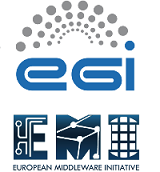Speaker
Impact
UCST together with the tool providers have defined processes to assure that
-
The tools evolve according to the needs of the user communities: The requirement gathering and processing workflow and tool operated by EGI assure that the needs of VRCs are collected and communicated to tool developers and that priorities consider the size and importance of requestor VRCs.
-
New features become available in the tools as a response to community needs and in a timely manner: Agile software development methods have been put in place to implement new features swiftly despite the continuously changing landscape of user communities.
-
Tools can be added and removed from the set to reflect the overall needs of VRCs: The User Community Board and User Services Advisory Group provide representation for VRCs and drive the evolution of user-facing services.
The VRC is defined as an organisational grouping that brings together transient Virtual Organisations within a persistent and sustainable structure. The EGI collaboration and especially the EGI-InSPIRE project provides several human and software services that simplify the management of grid user communities within European scientific collaborations. Why the human services are provided by the various NGIs that participate in EGI, the software services can be integrated and customised into the communities own research tools and environments. The presentations and demos will show real-life examples of how different communities benefit from the services and expand their support portfolios by them.
Conclusions
The workshop shares the technical details about the services that EGI offers for VRCs. These services enable VRCs to achieve more efficient and effective work with the Grid while stay focused on their domain specific sciences. APIs and other mechanisms provided by these service offer easy integration and customisation of services into community environments. The EGI VRC model contributes to the sustainability of European Distributed Computing Infrastructures and to the sustainability of European scientific communities to a large extent.
Description of the work
EGI is a partnership between National Grid Initiatives (NGIs) and a coordinating body, named EGI.eu to operate a sustainable, pan-European Grid infrastructure for international scientific communities. EGI.eu is seen as the glue enabling coherence between the NGIs for the benefit of their users and members of Virtual Research Communities or VRCs. The NGIs and the User Community Support Team of EGI.eu (UCST) provide various services for structured user communities of EGI. These facilitators enable VRCs to deliver more high quality, more standardised and more efficient services for their members, for European scientific communities. These central tools eliminate the need of developing similar expertise or software within multiple scientific collaborations. These services are important assets for VRCs because the human services and software tools provide a significant contribution to the user support processes of scientific collaborations. The current list of technical service that EGI-InSPIRE provides for VRCs is:
• Requirement gathering system
• GGUS (Global Grid User Support) System
• Training event registry
• Repository of training materials
• Registry of trainers
• Application database
• VO management portal (Operations Portal)
• Services and resources for the setup, management and monitoring of VOs
• Web pages
• Email lists
Overview
Scientific research is no longer being conducted within a single research group in a single institution in a single country but in Virtual Research Communities (VRCs) that span national borders encompassing many different organisations but with a need to share ICT resources. EGI provides the e-Infrastructure that enables the researchers within a VRC to collaborate, communicate, share resources, access remote computers or equipment and produce results as effectively as if they, and the resources they require, were physically co-located. Becoming an identified VRC within EGI offers several benefits for researchers, scientists and the developers of distributed scientific applications. The workshop will feature a series of technical talks and demos about the services and software tools that are offered by the EGI-InSPIRE project for VRCs and shows methods for the integration of these services into community portals and research environments.
URL
www.egi.eu/user-support/becoming_a_community
www.egi.eu/user-support/technical_services

